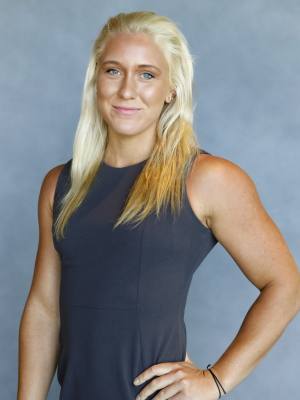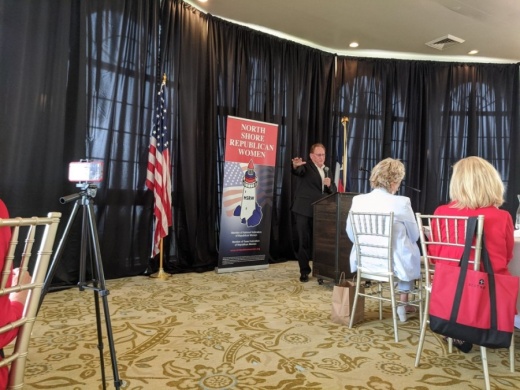Keough spoke at a Sept. 2 North Shore Republican Women’s luncheon in Montgomery, where he said he believes the response to coronavirus has been largely political, forcing residents into isolation, shaming those who do not wear protective face masks and engaging in a "group-think" mentality. The virus—which has an estimated mortality rate of 3% in the U.S., according to the John Hopkins University—has destroyed the economy and increased depression and anxiety, he said.
“God created us for community. Listen: He didn’t create us to stuff ourselves into a house and be alone all day,” Keough said. “Why do you think this is all happening? If you don’t think this is political, you are not paying attention.”
This contradicts what many health officials have said. In June, the Montgomery County Public Health Department urged residents to abide by CDC guidelines as cases continued to spread at a high rate.
Health officials have asserted that mask use and social distancing are effective defenses against the virus and have said they are alarmed that elected officials are alleging COVID-19 recommendations are guided by reasons other than protecting public health.
“There are political issues with the masks that are totally unscientific and are counter-scientific,” said Dr. Peter Plantes, physician executive for hc1, a cloud-based platform that takes COVID-19 data from laboratories across the U.S. “The defense against COVID[-19] is everybody wearing a mask and staying six feet apart. It’s not that difficult.”
‘Take my chances’
Throughout the first few months of the pandemic, Keough said he hesitated to put out orders restricting residents but eventually had to comply with orders and guidance from Gov. Greg Abbott and President Donald Trump.Keough also alleged that the president of H-E-B and representatives from Montgomery County hospitals called him and placed pressure on him.
“[He] asked me to shut down Montgomery County. I told him he’s lost his mind,” Keough said. “I’m very sensitive to our civil liberties.”
Keough said he watched the COVID-19 numbers daily, waiting for the hospitals to be overrun, as many experts warned. He waited for Montgomery County to reach 100,000 cases by the end of April, as he said some models predicted. But neither happened.
As of Sept. 3, Montgomery County has tallied 9,046 total cases, with 120 deaths and 1,260 active cases, according to the county’s public health department. Of the total cases, 6,257 have recovered.
According to these numbers, Montgomery County has a fatality rate—calculated as deaths divided by total cases—of 1.32%.
“And we should just roll over and group-think and just go along with it? And the numbers don’t show it. I’m going to take my chances with the 99% of people who recover—how about you?” Keough said. “We’re shutting down the economy. We’re shutting down businesses. We’re destroying families, ... and you want us to keep this thing going?”
According to data from the Southeast Texas Regional Advisory Council, Montgomery County hospitals have not once reached capacity within their general beds since at least March 10. As of Sept. 4, there are 911 general beds in use in the county, with 43 suspected and confirmed coronavirus cases, and a general bed capacity of 1,275.
“You keep hearing the message that we have to flatten the curve, we can’t overwhelm the hospitals, [but] we’re not overwhelming the hospitals,” Keough said. “It has not happened. It is not going to happen.”
Keough also pointed to what he described conflicting messages from Houston-area hospital officials, referencing how they had warned of an impending overflow, which Keough claimed they then quickly backtracked after Gov. Greg Abbott suspended elective surgeries in four counties in June.
“All of a sudden, when that happened, the message from the hospitals was, ... ‘We’re not going to be overwhelmed,” he said. “It’s constant false messaging ... to convince you of something that isn’t going to happen.”
Winners and losers
Keough said the governor’s orders, which initially allowed places, such as malls—but not bars and salons—to open with limited capacity, essentially picked which businesses would survive and which ones would be forced to shutter. He also criticized what he characterized as the nation’s general acceptance of protests following the death of George Floyd while prohibiting small gatherings and barring businesses from fully opening.“I’m sitting here, watching 60,000 people in the city of Houston march arm-in-arm without masks—no sanitation, with no social distancing,” he said. “They shut down the Republican Convention with 6,500 people and yet had no problem with 60,000 people walking the street right outside the convention center.”
Photos captured by Community Impact Newspaper on June 2 showed thousands of protestors tightly congregated in Houston. However, many wore masks and the demonstrations occurred outdoors, as opposed to inside the convention center.
Following the cancellation of the Republican Convention, Keough took to Facebook to announce his willingness to host the event in Montgomery County.
“I’m all in favor of allowing protests—that’s our First Amendment right—but I’m also in favor of political speech,” he said. “This is a political stunt put on by the mayor of Houston. Let’s call it what it is. That’s exactly what happened.”
Keough further said he believes that the heightened attention surrounding the virus will die down following the November election, though he did not provide clear reasons as to why.
“You wait and see what happens on November 5, because we’re probably going to move on to a new topic,” he said. “You don’t think there’s a side to this political element that’s trying to control us? They want to turn this into a racial issue? This is not racial at all. This is about power. This is about survival and destruction of our country—the re-education of our children, if you will—and the dumbing-down of America.”
Politics aside
Health experts have said that as restrictions ease and individuals grow more lax about social distancing and wearing masks, the number of coronavirus cases generally rises.Keith Barber, the CEO of Houston Methodist Willowbrook Hospital, said in June that after nonessential businesses closed for several weeks in late March and April, the community benefited from social distancing and saw a drop in case numbers. But once businesses reopened, case numbers peaked again.
“I don’t think we were hearing as much from our state leaders and so forth about the need for social distancing and wearing masks and not congregating, ... so our COVID[-19] numbers started really climbing,” he said.
Other health officials said hospitals have been struggling to ensure they will not reach capacity and run out of beds for afflicted individuals.
“We have been stretched in both our general and ICU bed capacity," said Jason Glover, VP of operations at Memorial Hermann The Woodlands Medical Center, in late July. “In some hospitals, we have expanded into nontraditional beds. ... We have a very committed and courageous staff, but they are carrying a heavy load.”
Glover further asserted that despite how different the responses to the coronavirus have been in Harris County and Montgomery County, the virus does not follow political or county borders.
“I feel sometimes there is a misconception that COVID[-19] is not an issue in Montgomery County,” he said. “While not at the magnitude of Harris County, our case count has been increasing at a concerning level.”
Professor Benjamin Neuman, the chair of the Texas A&M University-Texarkana Biological Sciences Department, said the U.S. as a whole entered a “denial phase” when the outbreak began, and politics have detracted from the public safety message.
“There are some aspects where I would say we are still in that. The response became politicized here in a way that it wasn’t politicized in a lot of other countries,” he said. “You essentially had almost party lines about whether people would believe the virus was real and very different views with how it should be dealt with.”
Neuman said he has worked to curb polio outbreaks in Syria, as well as to help slow outbreaks of Ebola and monkey pox, and the approach was always the same: Test, trace and isolate. But the fourth prong, he added, is to communicate and reassure the public.
“And that works really well, and as long as you don't run into significant opposition on the ground to these basic public health measures, that works anywhere and on any virus,” he said. “I’ve never seen any response that was as cavalier as the response to COVID-19.”
Additional reporting by Ben Thompson and Danica Lloyd





